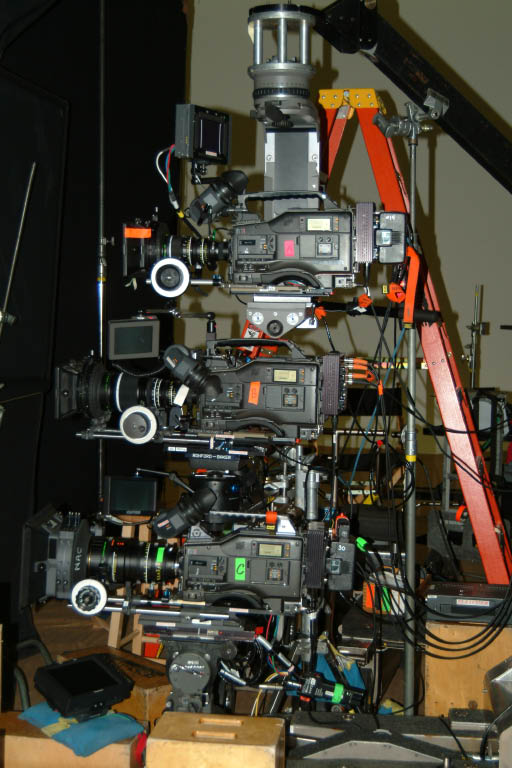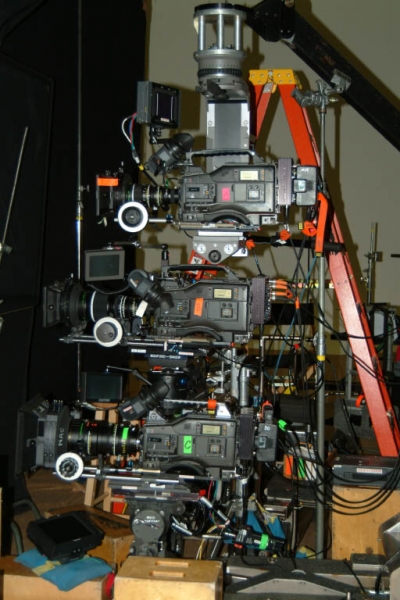
Last time, we chatted with Michael Bravin of Band Pro Film & Digital about some of the major changes across the industry landscape as digital motion picture technology, the economy, and the industry generally shift and evolve. This time, From the Trenches touched base with Tom Fletcher, another industry veteran and VP of one of the leading camera rental facilities in the country, Chicago-based Fletcher Camera. Tom shares many of Michael’s views about how the sales and rental industries are changing, and in fact, goes so far as to suggest that calling his business a “rental business” at all is an antiquated approach.
“I don’t even call our company a ‘rental house’ anymore,” he says. “We’ve been using the term ‘production partner’ for a while. People come to us to figure out not only the camera they should use, but also the workflow, and to be a liaison between the production and post-production worlds. We’ve been doing HD for 11 years, and are always advising producers-‘someone has to talk to post.’ Often times, they have not done it. So we are saying to them that we need to be part of their production.”
Thus, Fletcher says, the nature of what has traditionally been called “the rental business” is changing right along with the technology.
“Training is important, and we are deeply involved in it, but from a business point of view, crews come to us sometimes with a three-thousand-dollar package and want it to be our responsibility to train them. If you rent a car from Hertz, and you decide it would be exciting to drive a manual transmission, but you have never driven a stick, would Hertz teach you? Who is responsible if you crash? So, if people want that training, they should be paying for that. But, instead, what is happening is that there are so many digital camera systems out there-you can’t possibly get trained on them all at the same time. If you get trained on the RED system, that doesn’t mean you can use other systems without more education and experience in the field.”
Fletcher’s point is that there is a conundrum afoot. Various camera systems and workflow approaches are proliferating far faster than crews with expertise to use those technologies in the field under a wide range of conditions. Therefore, it is natural that sales and rental companies should step in to provide that expertise and support. And yet, doing so, by definition, means changing the nature of their business, which is a viable challenge for some, and very complicated for others in today’s rickety economic climate.
And there are other issues to be sorted out. How to budget digital shows? Labor and staffing issues, and even insurance issues-the list goes on and on.
“The insurance industry is still adapting to how to insure this equipment,” says Fletcher. “If data disappears and the camera works fine-there is such a thing as operator error insurance, but most companies don’t carry it. For an operator being asked to learn 20 different cameras? Today, there really are about 20 different cameras available for serious production, and the formats are all over the place-HDCAM-SR to S2 to P2 to ProRes to recording uncompressed. There’s a bounty of ways to record the data, but no standard for dealing with any of it. In my opinion, production companies should carry insurance that covers (operator error and other mishaps that have nothing to do with the equipment’s technical performance).
“And the industry isn’t ready yet to deal with how easy it is to copy the material and share it,” he adds. “Digital asset managers have a huge responsibility. They handle your digital negative and you need to pay them enough to make sure they don’t copy your movie to a thumb drive and sell it or post it to the Internet. There are solutions to all these things, but no industry-standard solution and no solution that doesn’t require help from people with our kind of expertise. So, again, that changes the rental industry quite a bit.”
And more cultural and technological shifts are coming, Fletcher insists. On the technology side, he points to a huge development that has already shifted the paradigm-the rise to dominance of CMOS sensor technology. The maturation of the CMOS approach means, he suggests, that more sensors are hitting the market each day, and therefore, more cameras are available, and more will soon become available. This means rental companies will have more systems to possibly offer customers, but it also means each system will, in turn, feature new and different ways to record imagery, and thus, will present the industry with new and different options for dealing with data in the field and in post. In turn, that means new workflows will continually have to be developed, and then revised, for those new systems and the projects that use them. And on and on it will go …
“It’s a changing dynamic, and what you can now do with CMOS technology is at the heart of the change,” Fletcher adds. “That is what allowed RED to do what they are now doing, (Silicon Imaging’s) S1-2K to do what they are doing, and now, to also allow Canon, and others, to do what they are doing with digital SLR still cameras, which will become more important to our industry in the coming months.”
Therefore, the recession and industry labor upheavals that have wracked the entertainment space for the last couple of years, in combination with the rapid development of these new imaging technologies, have, as Fletcher and Band Pro’s Michael Bravin both suggest, created a double dynamic. It’s a dynamic by which “people are being pushed to the new technology, which is good for our business (as sales and rental companies), but it’s also fundamentally changing our business, since we have to help them figure out workflows and educate people on the technology and those workflows,” Fletcher suggests. “The industry is in a fundamentally different place now, and we all have to adjust as a result.”
It’s this “fundamentally different place” that I will largely be exploring in the coming weeks and months in this column-from a technology perspective, of course, but also from a business and cultural perspective. I invite your feedback, ideas, and suggestions as we begin to dig deeper into the heart of this paradigm shift.

